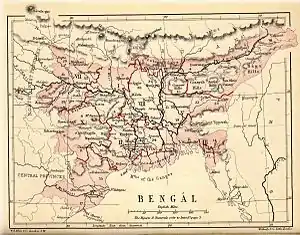Khadga dynasty
The Khadga dynasty (Bengali: খড়্গ বংশ) was a dynasty which ruled the areas of Vanga and Samatata in Bengal from the mid 7th to early 8th Century CE.[1] Chronologically, the dynasty emerged as a powerful kingdom between the fall of Gauda Kingdom and the rise of the Pala Empire. Their ascendancy may have been immediately preceded by the overthrow of a previously ruling Bhadra dynasty.[2] While they did not assume imperial titles, the Khadgas retained sovereignty over the ancient kingdom of Vanga and later conquered Samatata.[3] It was succeeded by the Deva dynasty.[4]
Khadga dynasty | |
|---|---|
| 625 CE–After 716 CE | |
| Capital | Karmanta Vasaka |
| Religion | Buddhism |
| Government | Monarchy |
| Raja | |
• 625-640 | Khadgodyama (first) |
• 716-? | Udirnakhadga (last) |
| Historical era | Classical period |
• Established | 625 CE |
• Disestablished | After 716 CE |
| Today part of | Bangladesh |
| History of Bengal |
|---|
 |
List of rulers
| Titular Name | Reign | Notes |
|---|---|---|
| Khadgodyama (খড়্গোদ্যম) | 625-640 | Father of Jatakhadga |
| Jatakhadga (জাতখড়্গ) | 640-658 | Father of Devakhadga |
| Devakhadga (দেবখড়্গ) | 658-673 | Queen Prabhavati (প্রভাবতী) |
| Rajabhatta (রাজভট্ট) | 673-707 | Son of Devakhadga |
| Balabhatta (বলভট্ট) | 707-716 | Son of Devakhadga |
| Udirnakhadga (উদীর্ণখড়্গ) | ?? |
References
- Sailendra Nath Sen (1 January 1999). Ancient Indian History And Civilization. New Age International. p. 277. ISBN 978-81-224-1198-0. Retrieved 18 April 2012.
- Bari, Latiful, ed. (1979). Bangladesh District Gazetteers: Jessore. Bangladesh Government Press. p. 39.
- Ray, Krishnendu (2012). "Khadga Dynasty". In Sirajul Islam; Miah, Sajahan; Khanam, Mahfuza; Ahmed, Sabbir (eds.). Banglapedia: the National Encyclopedia of Bangladesh (Online ed.). Dhaka, Bangladesh: Banglapedia Trust, Asiatic Society of Bangladesh. ISBN 984-32-0576-6. OCLC 52727562. OL 30677644M. Retrieved 25 October 2023.
- Singer, Noel F. (2008). Vaishali and the Indianization of Arakan. New Delhi: APH Publishing Corp. ISBN 978-81-313-0405-1. OCLC 244247519.
This article is issued from Wikipedia. The text is licensed under Creative Commons - Attribution - Sharealike. Additional terms may apply for the media files.